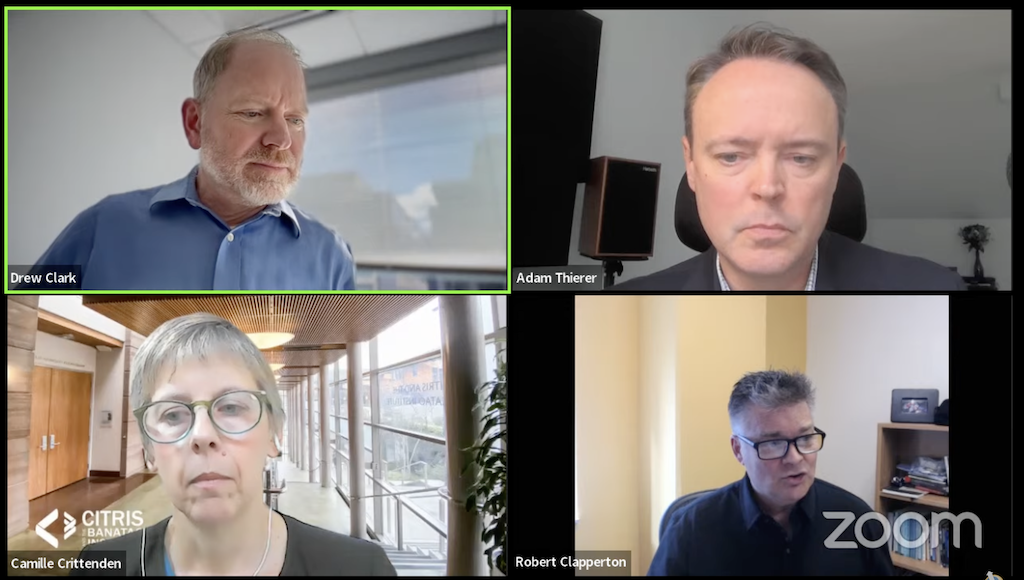One Year After ChatGPT, Washington Still Working Out its Relationship to AI: Experts
The recent drama at OpenAI reflects the ongoing debate on AI development, panelists said.
Jake Neenan

WASHINGTON, November 22, 2023 – One year after ChatGPT drew attention to large language models and artificial intelligence, there is still uncertainty on the regulatory approach Washington will ultimately take on AI, experts said on Wednesday.
Sam Altman, CEO of the company behind ChatGPT, was fired on Friday before rejoining the company on Wednesday with a new board of directors. The now-ousted board members who forced out Altman reportedly clashed with him on the company’s safety efforts, with the board favoring slower, safer development and Altman focusing on expansion.
 Broadband BreakfastBroadband Breakfast
Broadband BreakfastBroadband Breakfast
More than 700 OpenAI employees signed a letter threatening to quit if the board did not agree to resign.
“There was, in the backdrop, a little bit of a policy angle to this,” said Adam Thierer, a Senior Fellow at the R Street Institute, on a Broadband Breakfast Live Online event. “This accelerationism versus de-celerationism.”
President Joe Biden’s October executive order on AI safety includes measures aimed at both ensuring safety and spurring innovation, with directives for federal agencies to generate safety and AI identification standards as well as grants for researchers and small businesses looking to use the technology.
“In an ideal world, they would go hand in hand,” said Camille Crittenden, co-founder of the University of California’s Expanding Diversity and Gender Equity in Tech Initiative. “Safety protections and safeguard would accelerate at a pace equal to that of technological innovations.”
But it’s not clear which side legislators on Capitol Hill might take in the future, panelists said.
Democratic lawmakers and witnesses at Congressional hearings have pushed for stronger legal guardrails and reporting requirements for companies using AI. They’re largely looking to prevent private information being used in training data and mitigate the effects of bias in language model output.
There’s reason to expand those guardrails, Crittenden said. She pointed to AI’s ability to generate pornographic images of people without their consent.
“That’s causing real social harm,” she said. “There’s very little recourse or responsibility being taken by the platforms that enable this.
Tech companies have advocated for fewer reigns on AI, citing a need to remain competitive as other nations race to develop their own large language models.
“We could undermine the engine of our success and potentially shoot ourselves in the foot as we face really stiff competition internationally,” Thierer said.
Our Broadband Breakfast Live Online events take place on Wednesday at 12 Noon ET. Watch the event on Broadband Breakfast, or REGISTER HERE to join the conversation.

Wednesday, November 22, 2023 – AI One Year After ChatGPT
Nearly a year has passed since ChatGPT became accessible to the public, seamlessly integrating into our daily lives. It has proven invaluable for tasks ranging from brainstorming to coding and composing essays or emails, offering convenience at our fingertips. But just like any technology dealing with a vast amount of information, ChatGPT also grapples with concerns such as content biases, the potential for harmful data collection, and the spread of misinformation. Now is an opportune time to reflect on the impact of ChatGPT over the past year, which has bridged the gap between science fiction and reality. How can we strike a balance between harnessing the advantages of ChatGPT and addressing its ethical and practical challenges? What lessons have we learned from its first year, and how might these shape the future of AI-driven language models?
Panelists
- Robert Clapperton, Associate Professor, The Creative School
- Camille Crittenden, Executive Director of CITRIS and the Banatao Institute and Co-founder of the CITRIS Policy Lab and the EDGE (Expanding Diversity and Gender Equity) in Tech Initiative at the University of California
- Adam Thierer, Senior Fellow, Technology & Innovation team, R Street Institute
- Drew Clark (moderator), Editor and Publisher, Broadband Breakfast
Panelist resources
- California Gov. Gavin Newsom’s Report on Generative AI, Releases Tuesday, Nov. 21, 2023
- White House Executive Order on AI, Camille Crittenden, Camille Crittenden, November 3, 2023
- Artificial Intelligence Legislative Outlook: Fall 2023 Update, Adam Thierer, October 17, 2023
- Biden AI Order, Broadband Breakfast, October 30, 2023
- Will Rinehart: Unpacking the Executive Order on Artificial Intelligence, Broadband Breakfast, November 15, 2023










